Archives - Page 2
-

Hekima Review No. 61 May 2020
Over the past few decades, there has been an increased level of self-consciousness on the African continent. Our political self-consciousness has grown, our economic self-consciousness continues to see a steady rise, and our theological self-consciousness has significantly advanced. One factor that explains this growth in consciousness is the realization of the value of Socrates’ famous aphorism, which I paraphrase as Africa know thyself and to thyself be true. Self-knowledge and self-examination are, therefore, a critical determinant in the development of our theological consciousness into theological self-consciousness.
-

Hekima Review No. 60 Dec 2019
In Mark 12:13-17, we see an encounter between Jesus, the Pharisees, and the Herodians. The latter groups of people attempt to trap Jesus through their questions about paying taxes to Caesar. Jesus is clever enough not to fall into this trap. He eventually silences the Pharisees and the Herodians with what has become a famous maxim: "Give back to Caesar what is Caesar's and to God what is God's:' This encounter Jesus had needs to be unpacked for it bears important consequences, not just in a religious paradigm, but also in a socio-political framework. The various characters in this narrative can be given symbolic meaning.
-
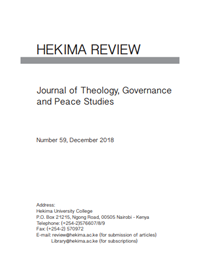
Hekima Review No. 59 (Dec 2018)
Ten years ago, I had an immersion experience at the Ossiomo Leper Settlement in the South-southern part of Nigeria. For many of the inmates that I met, leprosy represented a tragic turning point in their lives. Each one told me stories about what life used to be before leprosy, and how all that changed like the snap of a finger. One of the inmates, a jovial woman would often reminisce about the beauty of her younger days, how no man could pass her by without turning, at least for a second look. “Where is such a man?” she would ask. Another inmate, a man, would tell me stories of how he had to leave everything he had worked for – his business, his properties, and his family – to begin life in this “no man’s land.” Their stories more often than not, climaxed with a decipherable pattern: how the infections hit them and things fell apart; how they were dropped at Ossiomo; how they were told that it would be just for a while and everything would soon be fine; how after the initial treatments, regular visits became occasional, then rare and eventually no more. Leprosy had made them citizens of nowhere.
-
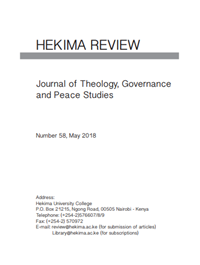
Hekima Review No. 58 (May 2018)
In October this year, the Church gathered in Rome for the “Synod on Youth.” In the Preparatory Document released last year ahead of the Synod, “Young People, the Faith and Vocational Discernment,” Pope Francis points out two goals at the heart of the Synod. First, accompaniment – to help the church “examine herself on how she can lead young people to accept the call to fullness of life and love;” and second, renewal - “to ask young people to help her in identifying the most effective ways to announce the good news today.”
-
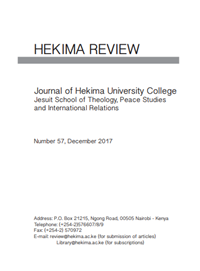
Hekima Review No. 57 (Dec 2017)
Regarded as an engine of human history, migration is as old as the human species. Migration continues to have far-reaching consequences in our contemporary society. According to the International Organization for Migration (IOM) 2014 report, the number of people living outside their country of origin worldwide has exponentially increased from 150 million in 2000 to 214 million in 2014. The IOM report has extrapolated that by 2050, the figure could rise to as much as 405 million.
-

Hekima Review No. 56 (May 2017)
The technological advancement in our world today has a big impact on the human person. While technological development has contributed immensely to the development of human life, its danger is tethered on the freedom with which people use their reason in their encounter with faith. To protect human freedom against the dangers posed to it by technology, a proper relationship between faith and reason should be developed. The limits of human freedom can be measured in the dialogue between faith and reason. The danger of technology is attributed to the separation of faith from reason. By separating itself from faith, Pope Benedict XVI argues, reason cannot fully grasp fundamental questions, such as “the question of God” and, subsequently, “the questions and the end of being itself.”
-
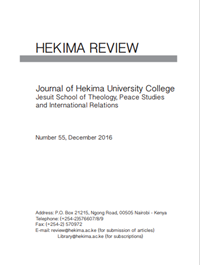
Hekima Review No. 55 (Dec 2016)
It is no surprise that the Catholic Church takes family seriously, for the family is the foundation of society. The family is the basic Christian unit for us Christians. As such the formation of the family (from marriage to a long-lasting mission in the world and the Church) needs to be understood carefully to permeate a climate of building truly the Church. We all come from families and we are shaped by them. Needless to say, separation entails us to long to belong more and more.
-
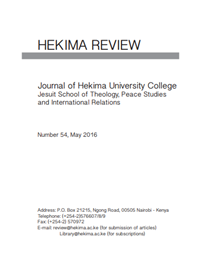
Hekima Review No. 54 (May 2016)
The image of the door has marked some important events since the opening of the Jubilee Year of Mercy. A door represents various actions. We open a door, we close it, we go through it, and people enter through a door. Opening a door is a task that can be easy, but at times difficult. The difficulty may come from the fear of the unknown, the stranger, the enemy. The apprehension of what we may encounter through the opening of the door hinges on our refusal to let others in. Which doors need to be opened? How far do we refuse to open them? Reflecting on the simple gesture of opening the door may lead us to reconsider and re-examine our attitudes as Christians or as believers.
-
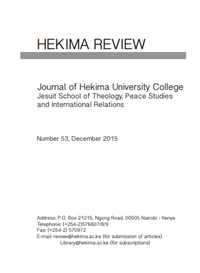
Hekima Review No. 53 (Dec 2015)
On 12th December 2015, 195 countries adopted a universal, legally binding climate change agreement in Paris, France. The purpose of the Paris Agreement is to provide an action plan that will help enhance the implementation of the United Nations Framework Convention on Climate Change (UNFCC) by limiting global average temperatures to below 2 degrees Celsius above pre-industrial levels, with a further aim of limiting the increase to 1, 5 degrees Celsius. Key among the elements of the Paris Agreement are mitigation measures to reduce emissions, with countries submitting comprehensive national climate action plans known as Nationally Determined Contributions (NDC), that detail each country’s “ambitious” contributions towards achieving the goal of reducing emissions. The Paris Agreement will govern emission reductions from 2020, the year in which it will enter into force. However, for it to enter into force, it will require ratification by 55 countries that together account for at least 55% of global greenhouse gas emissions.
-
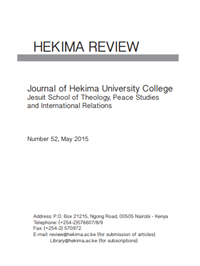
Hekima Review No. 52 (May 2015)
The fundamental mission of the Church is to evangelize. The Church evangelizes “when it seeks to convert, solely through the divine power of the message which it proclaims, both the personal and collective consciences of people, the activities in which they engage, and lives and concrete milieus which are theirs.” While aware of its mission, the Church is also conscious of the diversity and specificity of the contexts within which it carries out this mission. This diversity and specificity accords the One and Catholic Church different characteristics proper to the different regions of the world where it carries out its mission. This legitimate diversity is a feature that was also present in the early stages of the Church, hence Paul’s letters to the Church in Thessalonica, to the Church in Corinth, to the Church in Galatia, to the Church in Rome, and so forth; a recognition of the diversity of these local churches within the Universal Church. Today, we can thus legitimately speak of the Church in Europe, the Church in Asia, the Church in America, and the Church in Africa.

